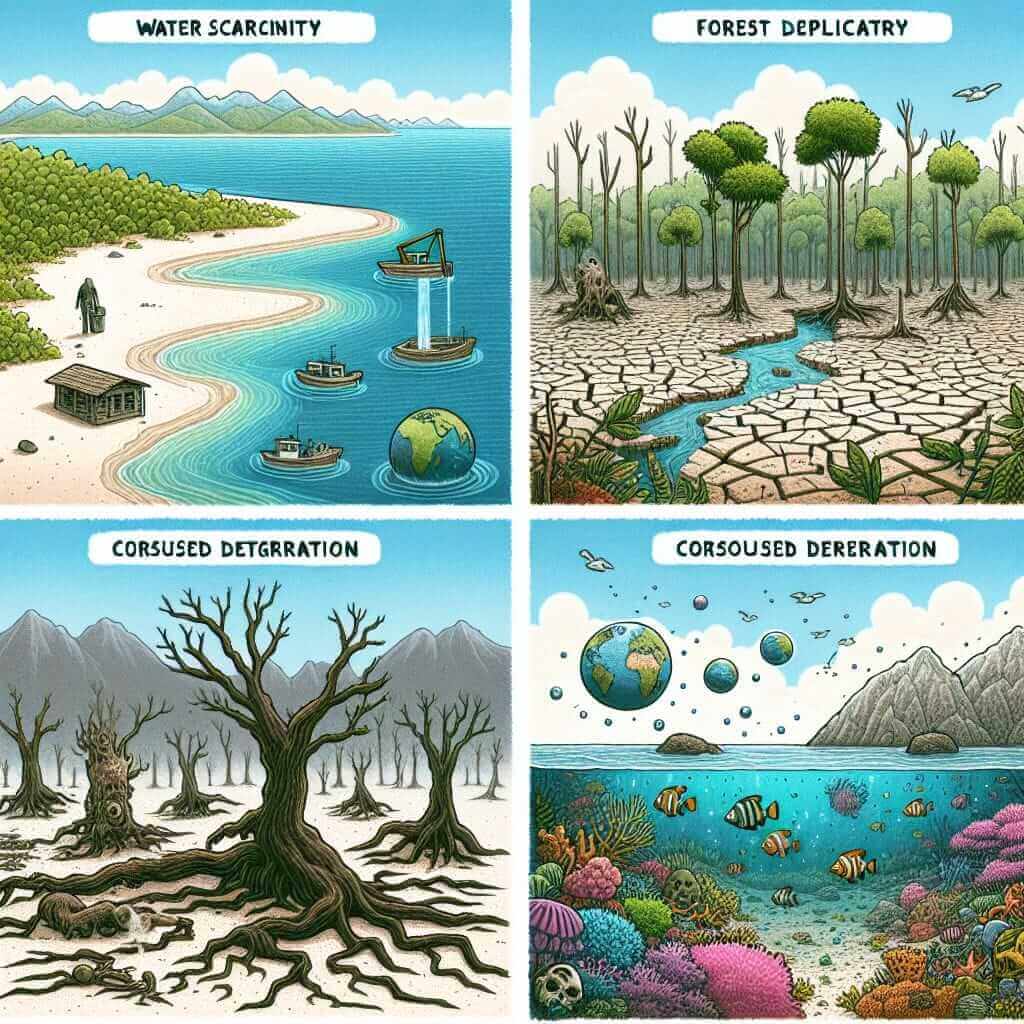The IELTS Reading section tests a candidate’s ability to understand and interpret academic texts. One prevalent and highly relevant topic that may appear in the reading materials is climate change. This theme is not only relevant to contemporary global issues but also provides a good basis for challenging questions. This article will delve into the topic of “What are the effects of climate change on natural resource availability?” through a comprehensive reading exercise, aligned with the IELTS Reading format. Given the growing importance of climate-related issues, this theme has a high probability of appearing in future tests.
Reading Exercise: Effects of Climate Change on Natural Resource Availability
The following reading passage is designed for Medium Text level, suitable for intermediate IELTS candidates. It aligns with the actual test structure and complexity.
Reading Passage
Climate change has widespread consequences on the availability of natural resources. From freshwater scarcity to the depletion of forests, the impact is profound and multifaceted.
One of the most significant effects of climate change is on water resources. Rising temperatures and altered precipitation patterns lead to reduced freshwater availability. This phenomenon is particularly severe in arid and semi-arid regions, where water scarcity is already a pressing issue. Climate change exacerbates these conditions, causing more frequent and intense droughts. Consequently, the agriculture sector, which heavily depends on water, faces significant challenges in maintaining crop yields.
Forests are another natural resource critically affected by climate change. Increased temperatures and shifts in precipitation negatively impact forest ecosystems. Prolonged dry periods and heatwaves make forests more susceptible to wildfires. Moreover, pests and diseases, thriving in warmer climates, further threaten forest health. The loss of forest cover not only affects biodiversity but also reduces carbon sequestration capabilities, creating a feedback loop that accelerates global warming.
Additionally, climate change affects soil quality. Higher temperatures increase the rate of soil degradation, while erratic weather patterns lead to soil erosion. These changes jeopardize food security by undermining agricultural productivity. Soil health is integral to sustainable agriculture, and its degradation can have far-reaching consequences for human populations.
Marine resources are also under threat. Ocean warming and acidification, driven by higher atmospheric carbon dioxide levels, affect marine life and ecosystems. Coral reefs, which support a vast array of marine species, are particularly vulnerable. The loss of coral reefs leads to decreased fish populations, threatening the livelihoods of communities dependent on fishing.
In conclusion, climate change has a profound impact on the availability of natural resources. Understanding these effects is crucial for developing strategies to mitigate the adverse outcomes and ensure sustainable resource management for future generations.

Questions
True/False/Not Given
- Climate change does not affect forest ecosystems.
- Water scarcity is worsened by climate change, especially in semi-arid regions.
- Soil degradation is decreasing due to climate change.
Multiple Choice
-
What is one of the consequences of warmer climates on forests?
a) Increased carbon sequestration
b) Vulnerability to wildfires
c) Enhanced biodiversity
d) Reduced temperature variations -
How does ocean acidification affect marine resources?
a) Improves fish population
b) Sustains coral reefs
c) Decreases fish populations
d) Supports marine ecosystems
Matching Information
6-8. Match each statement with the correct paragraph.
- Ocean acidification threatens marine life.
- Climate change exacerbates water scarcity issues.
- Pest infestations in forests are linked to warmer climates.
Sentence Completion
9-10. Complete the sentences below with words taken from the passage.
- The agriculture sector is affected by reduced freshwater availability due to __.
- Coral reefs, supporting numerous marine species, are vulnerable to __.
Answer Keys and Explanations
True/False/Not Given
- False – Paragraph 2 mentions the effects on forest ecosystems.
- True – Paragraph 1 states that climate change leads to reduced freshwater availability, especially in arid and semi-arid regions.
- Not Given – The text does not explicitly state that soil degradation is decreasing.
Multiple Choice
- b) Vulnerability to wildfires – Paragraph 2 describes how increased temperatures and shifts in precipitation impact forest ecosystems, making them more susceptible to wildfires.
- c) Decreases fish populations – Paragraph 4 states that the loss of coral reefs due to ocean acidification leads to decreased fish populations.
Matching Information
- Paragraph 4 – Ocean acidification threatens marine life.
- Paragraph 1 – Climate change exacerbates water scarcity issues.
- Paragraph 2 – Pest infestations in forests are linked to warmer climates.
Sentence Completion
- Climate change
- Ocean warming and acidification
Common Mistakes and Tips
- Misinterpreting True/False/Not Given: Students often confuse “False” with “Not Given.” Ensure you differentiate between what is explicitly mentioned and what is inferred.
- Vocabulary Comprehension: Pay attention to specific terms related to climate change and natural resources.
- Timing Management: Practice completing passages within the suggested time to improve speed and efficiency.
Vocabulary
- Depletion (n.) dɪˈpliːʃən : The reduction of something in quantity.
- Susceptible (adj.) səˈsɛptəbl : Likely to be influenced by something.
- Acidification (n.) əˌsɪdɪfɪˈkeɪʃən : The process of becoming acidic.
- Erosion (n.) ɪˈroʊʒən : The gradual destruction of something by natural forces.
Grammar
- Passive Voice: “Water resources are impacted by climate change.”
- Gerunds: “The increased temperatures result in forests becoming more susceptible.”
Advice for High Scores in Reading
- Practice Regularly: Engage with a variety of reading materials related to climate change and environmental issues.
- Enhance Vocabulary: Focus on academic terms and their usage.
- Understand Question Types: Familiarize yourself with the different question formats to improve accuracy and speed.
By consistently practicing with passages like these and paying attention to vocabulary and grammar, candidates can achieve higher scores in the IELTS Reading section.